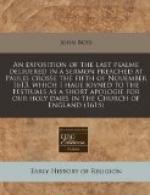[bm]_Luther_, Caluin, Vatablus, your English-Geneua bibles, & our new translation haue praise God in his sanctuarie, the which in holy scripture signifieth either heuen, or the temple, heauen is often called in sacred writ Gods sanctuarie, for [bn]thus saith he that is high and excellent, he that inhabiteth eternitie, whose name is the holy one, I dwell in the high and holy place. Christ in comming to vs is said to breake the heauens Esay 64. 1. and when he went from vs vnto his father a cloud tooke him vp into heauen Acts 1. and fro heauen he shal come againe to iudge the quicke and the dead 1. Thes. 4. 16. That his sanctuarie may be taken heere for heauen, is gathered out of the very next clause (praise him in the firmament of his power) the which (as [bo]_Caluin_ & [bp]other expositors haue well obserued,) is exegeticall, and expoundes the former, as if Dauid should haue said, praise the Lord in his sanctuary, that is in the firmament of his power, for the heauens declare the glory of God and the firmament sheweth his handy worke Psalm. 19. 1. let all people praise God our father in heauen, especially such as dwell with him [bq]in heauen, O praise the Lord all ye blessed Angels and Saints inhabiting his sanctuarie which is highest and holiest.
[Sidenote bm: Idem Genebrard et alij.]
[Sidenote bn: Esay 57. 15.]
[Sidenote bo: In loc.]
[Sidenote bp: Bellarmine in loc.]
[Sidenote bq: Genebrard Agellius Acernensis epist. in loc.]
[br]Other apply the word sanctuary to the Temple, so termed for two respects especially. 1. because God manifesteth his holines toward vs in that holy place more principally, calling it expresly [bs]_his house_. 2. a sanctuarie in regard of our holy seruice toward God, for albeit euery day be to the good man a sabbath, and euery place a temple; yet the God of Order hath appointed certaine times, and certaine places also, wherein hee will bee worshipped publiquely, saying Leuiticus 19. 30. Ye shall obserue my sabbaths, and reuerence my sanctuary. For our holines toward God concerneth vs [bt]one way in that we are men, and another way in that we are ioyned as parts to that visible mystical body which is his Church as men, wee are at our owne choyce both for time, and place, and forme, according to the exigence of our owne occasions in priuate, but the seruice which is to bee done of vs as the members of a publique body, must of necessity bee publique, and so consequently to bee performed on holy daies in holy places, and for this doctrine the scriptures afford both patent and paterne, the patent is reported by the Prophet Esay: Chap. 56. vers. 7. and repeated by Christ in [bu]three seuerall Euangelists: my house shall be called an house of prayer for all people. The paterns are manifold, I will enter into thine




